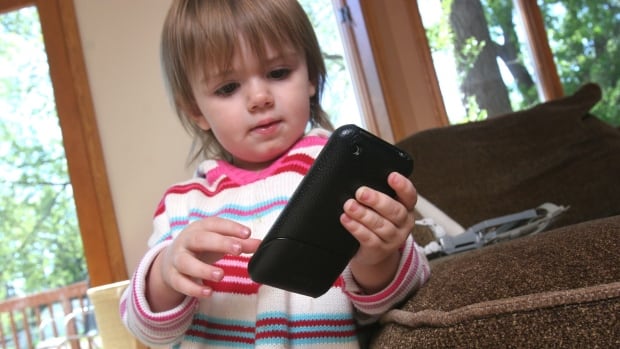Parents who steal a moment of calm by handing over a smartphone or tablet to a fussy toddler could set off a cycle of poor anger management and other problems, according to a recent study.
Research published last week in the journal Frontiers in Child and Adolescent Psychiatry says using such devices for emotional regulation “can be effective in the short term” but in the longer term could lead to technological addiction, “screen time tantrums” and make it harder for kids to cope with stressful situations.
The researchers, from Canada and Hungary, looked at more than 300 parents of children between age two to and five in Nova Scotia who completed questionnaires.

The parents reported their own distress about the demands of child-rearing and also how long their child watched TV, played video games on a console or used a device like a tablet or smartphone. They also answered questions about the child’s temperament, such as anger and impulsivity, during the pandemic lockdown and a year later in 2021.
The results suggest “if parents regularly offer a digital device to their child to calm them or to stop a tantrum, the child won’t learn to regulate their emotions,” Veronika Konok, the study’s first author and a researcher at Eötvös Loránd University in Budapest, said in a release.
The researchers called for health professionals working directly with families to ask parents about the use of digital media and to be especially attentive and supportive to parents of children with difficult temperaments who may be at higher risk.
Child psychiatry researchers say handing kids digital devices, like iPads, every time they have a tantrum could lead to future issues. One new study links too much screen time to emotional and anger management problems.
Chriselle Vaz of Toronto was hoping to avoid screens with her son, Caydin, who is almost four. But about two years ago, they got a TV, and Vaz relied on it more to manage him while she dealt with a newborn.
“We didn’t have much family support,” Vaz said. “I had to rely on a digital screen and devices to help me get some work done,” around the house.
A previous U.S. study suggested 65 per cent of parents use mobile devices to keep their child calm in public places.
Michelle Ponti, a pediatrician in London, Ont., wasn’t involved in the Nova Scotia study and chairs the Canadian Paediatric Society’s digital health task force and wrote its 2023 position statement on screen time for preschool children. The group’s guidelines say screen time isn’t recommended for children under two other for than video chatting with extended family since kids learn best from face-to-face interactions with caring adults.
“Screens used as a calming strategy becomes a vicious cycle, right?” Ponti said in an interview. “It often works very well in the short term. But what we learned from studies like this … is that in the long term, it actually creates more of a problem because then it’s harder for that child to learn any new skills without the screen.”
Ponti suggests “four Ms” for screen time and preschool children:
- Minimizing, such as ensuring sedentary screen time isn’t a routine part of caring for children younger than five and avoiding screens for at least one hour before bedtime.
- Mitigating, such as co-viewing age-appropriate, educational and interactive programming with children and curating playlists.
- Using screens mindfully, such as making a family media plan on when, how and where they may be used.
- Modelling healthy use of screens, such as encouragement in shared reading, outdoor play and crafts as well as avoiding background TV.
But Ponti also says screen use can be beneficial, such as educational apps or when keeping a child occupied during a painful procedure.
And while pediatric experts advise parents and caregivers not to rely on screens, they also acknowledge sometimes the adults just need a break.
Calm time for parent and child
“You have to be kind to yourself,” said Dr. Rachel Mitchell, an adolescent psychiatrist at Sunnybrook Health Sciences Centre in Toronto. “It’s the hardest job in the world.”
“If you’re at your wit’s end, if you’re frustrated, the day has not gone well, your child is tired and hungry, and you’re just buying yourself time to calm down and they’re using the device, this is not the worst parenting decision in the world that you’ve ever made.”
Vaz says her son has thrown tantrums when he’s told to stop using a device, but she also recognizes that how she approaches telling him to stop makes a difference.
“The tantrum starts because he thinks I’m being kind of unfair to him or not too gentle with him,” Vaz said. “But if I say ‘Caydin, I think we’ve had enough, let’s do story time’ … he’s much more open to it.”
Next, Konok and her fellow researchers want to study whether children with self-regulation problems also become dependent on devices or “digital pacifiers.”








